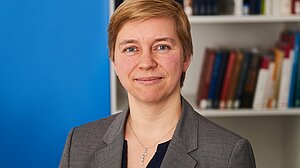Regina Elsner: "The pandemic works like a flashlight"
Regina Elsner’s research focuses on the way the Orthodox churches in Russia and Ukraine react to the social challenges and developments in their countries.

What impact does the pandemic currently have on your work?
To combine home office and childcare is challenging. Short essays and policy papers are easier to manage than in-depth studies. That fits well with the rise of public interest in how the churches deal with the quarantine measures in Eastern Europe – there are more requests for expertise in this current topic.
How has Covid-19 influenced your research topic / the objective of your research?
The pandemic works like a flashlight, highlighting the main hypothesis of my research topic. For a long time, the Orthodox churches in Eastern Europe missed the opportunity to develop a theological approach to the challenges of the modern world and the secular society. For different reasons they are used to position themselves in accordance with the political elites in social matters and have troubles to acknowledge the civil society as an autonomous actor.
Thus, in times of a crisis like the pandemic, the churches lack concepts and language to embrace the situation of the society. They try to keep in touch with state decisions, but these are ambivalent, and perceived as in some way “against the church”. This puts the church into a tremendous conflict of loyalty. The concept of “pro-life”, which shapes several socio-ethical debates in Orthodoxy, now also appears in a new, ambiguous light. Finally, due to different socio-political circumstances, the churches in Russia and Ukraine behave differently, which proves that context does matter for the church’s actions, and that there is not just one orthodox position in social questions.
In your view, what are the most important long-term effects of Covid-19 in your region?
I am not sure, if it is already possible to speak about long-term effects. In my field of interest, the pandemic strengthens patterns, which have been there before: a polarisation inside the churches between traditionalists and fundamentalists on the one side and the open minded faithful on the other; the lack of a concept of change within the churches; a rather high commitment to grassroots volunteering, while a common concept of solidarity and social justice is missing.
For Russia, the secularisation in society will move forward, because the Russian Orthodox Church has had huge difficulties to offer support to the society during this existential crisis. For Ukraine, one long-term impact could be the stabilisation of the new Orthodox Church of Ukraine, as she reacted very firmly and without any apocalyptic panic to the quarantine measures and quickly found ways to offer spiritual and humanitarian support beyond the church walls. I suppose, there will be a further development of ecumenical commitment to social matters. Obviously—and unfortunately—the Ukrainian Orthodox Church (Moscow Patriarchate) is not part of this movement, due to its own inner tensions and ambivalent position to the quarantine measures.
Looking at your discipline, how will the experience of the pandemic change how research is done in general?
Like other disciplines, theology has moved online, which will help to develop different forms of virtual exchange. It also bears a huge chance of internationalisation, as it becomes easier to include local experts from all over the world—a chance for the Western scientific community to talk with Orthodoxy in Eastern Europe rather than about it. On the other hand, the role religion has played during the pandemic causes a lot of confusion, thus pointing to the need for greater religious literacy among policy experts and social scientists. Hopefully this will strengthen the theological disciplines and especially empower science-communication in theology.
Regina Elsner is a researcher at ZOiS. In her research project she analyses the role of the Orthodox church in Russia and Ukraine.